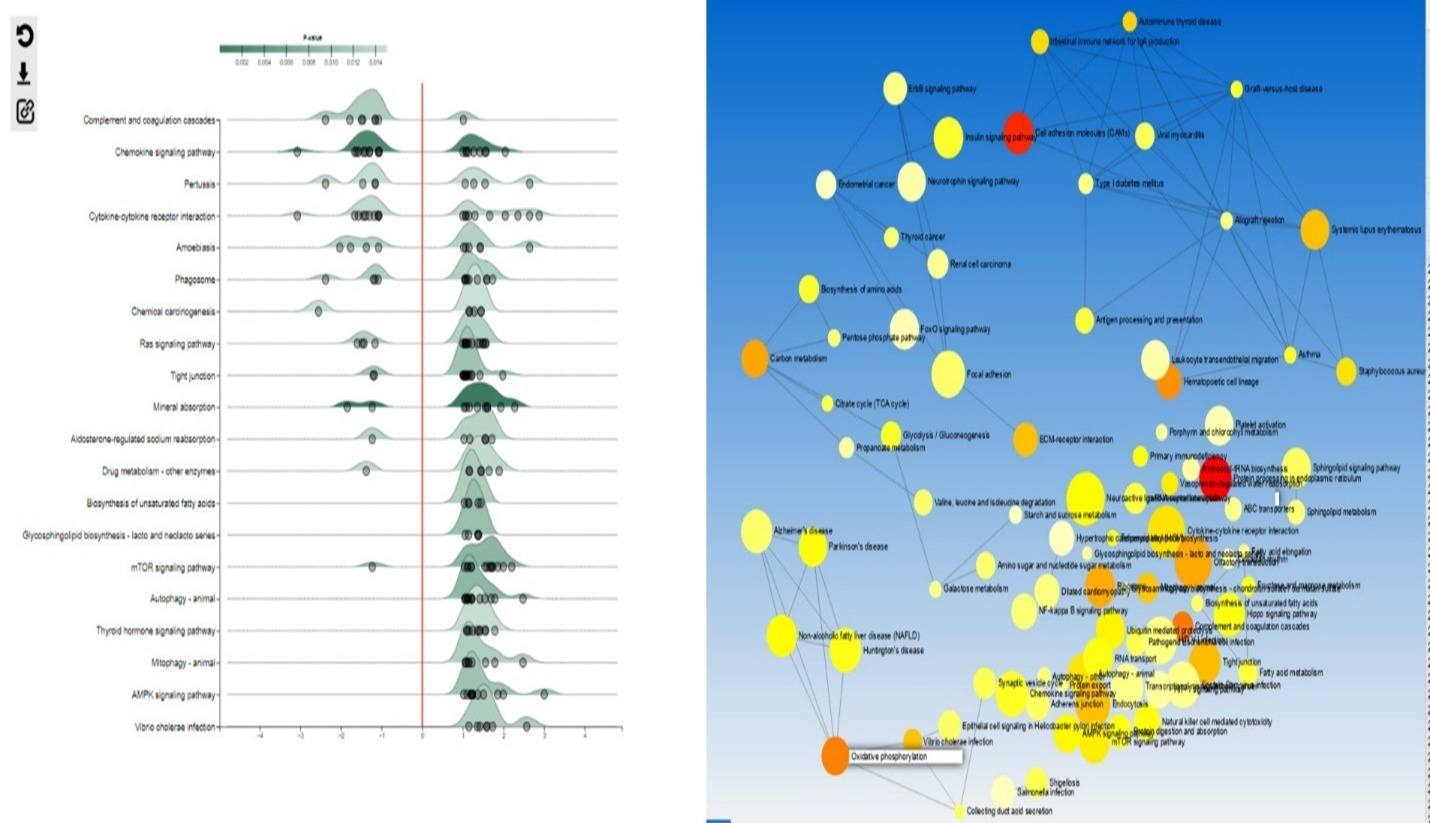Back
Poster Session E - Tuesday Afternoon
E0190 - Gene Expression and Pathway Analyses Reveal Distinctions Between Eosinophilic Esophagitis Pre and Post Treatment With Glucocorticoids
Tuesday, October 25, 2022
3:00 PM – 5:00 PM ET
Location: Crown Ballroom

Shivabalan Kathavarayan Ramu, MBBS
Mayo Clinic
Rochester, MN
Presenting Author(s)
Shivabalan Kathavarayan Ramu, MBBS1, Anjali Byale, MBBS1, Achintya Singh, MBBS2
1Mayo Clinic, Rochester, MN; 2Cleveland Clinic, Rochester, MN
Introduction: Eosinophilic esophagitis (EoE) is a distinct entity causing significant morbidity and that which responded to anti-allergic treatment. We performed a secondary analysis of gene expression microarray GSE36725 dataset published in the Gene Expression Omnibus using samples of patients with EoE before and after successful treatment with glucocorticoids.
Methods: Total RNA was extracted from the formalin fixed tissue and hybridized to Affymetrix Gene ST 1.0 Arrays and microarray data analyzed for 10 samples (5 pairs). The Affymetrix probe IDs of all the rows were converted to their respective gene IDs by DAVID (Database for Annotation, Visualization and Integrated Discovery) (https://david.ncifcrf.gov/) tool. The converted dataset was analyzed using the Networkanalyst.ca software.
Results: A total of 32 significant pathways were found after Kyoto Encyclopedia of Genes and Genomes (KEGG) pathway enrichment analysis by Welch’s t test ranking. P < 0.05 was regarded as indicating statistical significance. The top two enriched pathways were Mineral absorption (P=0.0067) and chemokine signaling (P=0.0084) and the top two enrichment categories were protein processing in endoplasmic reticulum (P< .05) and cell adhesion molecules (P< .05) (Figure1). The top genes upregulated with glucocorticoid treatment included CRISP3 (5.49-fold change), SPINK7 (5.49-fold change), TGM3 (5.49-fold change), EPGN (5.49-fold change) and UPK1A (5.49-fold change). Among genes downregulated with glucocorticoid treatment included TNFAIP6 (-5.29-fold change), POSTN (-4.57-fold change), JCHAIN (-4.55-fold change), ALOX15 (-3.36-fold change) and CCL26(-3.07-fold change). Based on our results, CRISP3, SPINK7 and TGM3 genes seem to be upregulated with glucocorticoid treatment whereas, TNFAIP6, POSTN and JCHAIN are the top genes that are downregulated with glucocorticoid treatment that have the highest sensitivity and specificity as diagnostic markers for successful treatment of EoE.
Discussion: CRISP3(Cysteine-rich secretory protein 3) and SPINK7(serine peptidase inhibitor, kazal type 7) are part of the differentiation program of human esophageal epithelium and that SPINK7 depletion occurs in a human allergic, esophageal condition termed eosinophilic esophagitis and are called as key barrier genes. This study shows that Glucocorticoid treatment improves the esophageal epithelial barrier integrity in cases of EoE.

Disclosures:
Shivabalan Kathavarayan Ramu, MBBS1, Anjali Byale, MBBS1, Achintya Singh, MBBS2. E0190 - Gene Expression and Pathway Analyses Reveal Distinctions Between Eosinophilic Esophagitis Pre and Post Treatment With Glucocorticoids, ACG 2022 Annual Scientific Meeting Abstracts. Charlotte, NC: American College of Gastroenterology.
1Mayo Clinic, Rochester, MN; 2Cleveland Clinic, Rochester, MN
Introduction: Eosinophilic esophagitis (EoE) is a distinct entity causing significant morbidity and that which responded to anti-allergic treatment. We performed a secondary analysis of gene expression microarray GSE36725 dataset published in the Gene Expression Omnibus using samples of patients with EoE before and after successful treatment with glucocorticoids.
Methods: Total RNA was extracted from the formalin fixed tissue and hybridized to Affymetrix Gene ST 1.0 Arrays and microarray data analyzed for 10 samples (5 pairs). The Affymetrix probe IDs of all the rows were converted to their respective gene IDs by DAVID (Database for Annotation, Visualization and Integrated Discovery) (https://david.ncifcrf.gov/) tool. The converted dataset was analyzed using the Networkanalyst.ca software.
Results: A total of 32 significant pathways were found after Kyoto Encyclopedia of Genes and Genomes (KEGG) pathway enrichment analysis by Welch’s t test ranking. P < 0.05 was regarded as indicating statistical significance. The top two enriched pathways were Mineral absorption (P=0.0067) and chemokine signaling (P=0.0084) and the top two enrichment categories were protein processing in endoplasmic reticulum (P< .05) and cell adhesion molecules (P< .05) (Figure1). The top genes upregulated with glucocorticoid treatment included CRISP3 (5.49-fold change), SPINK7 (5.49-fold change), TGM3 (5.49-fold change), EPGN (5.49-fold change) and UPK1A (5.49-fold change). Among genes downregulated with glucocorticoid treatment included TNFAIP6 (-5.29-fold change), POSTN (-4.57-fold change), JCHAIN (-4.55-fold change), ALOX15 (-3.36-fold change) and CCL26(-3.07-fold change). Based on our results, CRISP3, SPINK7 and TGM3 genes seem to be upregulated with glucocorticoid treatment whereas, TNFAIP6, POSTN and JCHAIN are the top genes that are downregulated with glucocorticoid treatment that have the highest sensitivity and specificity as diagnostic markers for successful treatment of EoE.
Discussion: CRISP3(Cysteine-rich secretory protein 3) and SPINK7(serine peptidase inhibitor, kazal type 7) are part of the differentiation program of human esophageal epithelium and that SPINK7 depletion occurs in a human allergic, esophageal condition termed eosinophilic esophagitis and are called as key barrier genes. This study shows that Glucocorticoid treatment improves the esophageal epithelial barrier integrity in cases of EoE.

Figure: Network analysis of enriched pathways
Disclosures:
Shivabalan Kathavarayan Ramu indicated no relevant financial relationships.
Anjali Byale indicated no relevant financial relationships.
Achintya Singh indicated no relevant financial relationships.
Shivabalan Kathavarayan Ramu, MBBS1, Anjali Byale, MBBS1, Achintya Singh, MBBS2. E0190 - Gene Expression and Pathway Analyses Reveal Distinctions Between Eosinophilic Esophagitis Pre and Post Treatment With Glucocorticoids, ACG 2022 Annual Scientific Meeting Abstracts. Charlotte, NC: American College of Gastroenterology.
